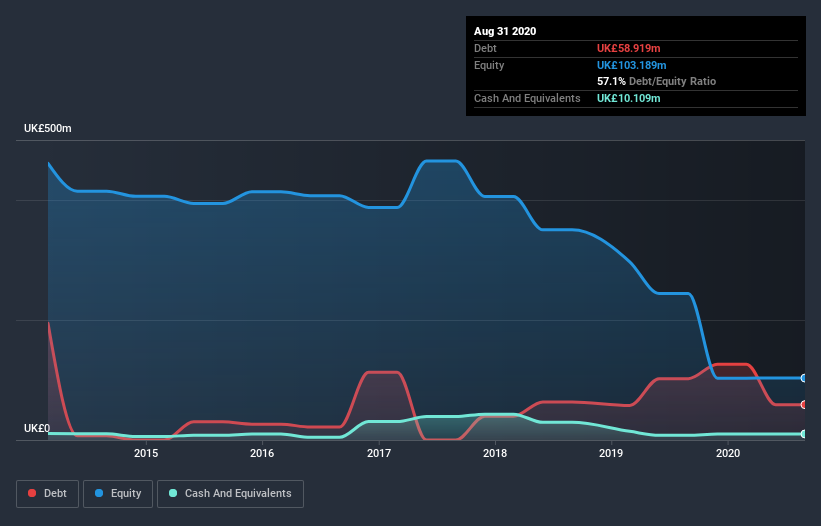
The external fund manager backed by Berkshire Hathaway's Charlie Munger, Li Lu, makes no bones about it when he says 'The biggest investment risk is not the volatility of prices, but whether you will suffer a permanent loss of capital.' So it seems the smart money knows that debt - which is usually involved in bankruptcies - is a very important factor, when you assess how risky a company is. We can see that Stobart Group Limited (LON:STOB) does use debt in its business. But should shareholders be worried about its use of debt?
When Is Debt Dangerous?
Debt is a tool to help businesses grow, but if a business is incapable of paying off its lenders, then it exists at their mercy. If things get really bad, the lenders can take control of the business. However, a more common (but still painful) scenario is that it has to raise new equity capital at a low price, thus permanently diluting shareholders. By replacing dilution, though, debt can be an extremely good tool for businesses that need capital to invest in growth at high rates of return. When we think about a company's use of debt, we first look at cash and debt together.
Check out our latest analysis for Stobart Group
What Is Stobart Group's Debt?
You can click the graphic below for the historical numbers, but it shows that Stobart Group had UK£58.9m of debt in August 2020, down from UK£102.2m, one year before. However, because it has a cash reserve of UK£10.1m, its net debt is less, at about UK£48.8m.

How Healthy Is Stobart Group's Balance Sheet?
According to the last reported balance sheet, Stobart Group had liabilities of UK£159.0m due within 12 months, and liabilities of UK£214.1m due beyond 12 months. Offsetting these obligations, it had cash of UK£10.1m as well as receivables valued at UK£41.7m due within 12 months. So it has liabilities totalling UK£321.3m more than its cash and near-term receivables, combined.
Given this deficit is actually higher than the company's market capitalization of UK£214.9m, we think shareholders really should watch Stobart Group's debt levels, like a parent watching their child ride a bike for the first time. Hypothetically, extremely heavy dilution would be required if the company were forced to pay down its liabilities by raising capital at the current share price. The balance sheet is clearly the area to focus on when you are analysing debt. But ultimately the future profitability of the business will decide if Stobart Group can strengthen its balance sheet over time. So if you're focused on the future you can check out this free report showing analyst profit forecasts.
Over 12 months, Stobart Group made a loss at the EBIT level, and saw its revenue drop to UK£149m, which is a fall of 2.4%. That's not what we would hope to see.
Caveat Emptor
Importantly, Stobart Group had an earnings before interest and tax (EBIT) loss over the last year. Its EBIT loss was a whopping UK£48m. When we look at that alongside the significant liabilities, we're not particularly confident about the company. It would need to improve its operations quickly for us to be interested in it. Not least because it burned through UK£15m in negative free cash flow over the last year. So suffice it to say we consider the stock to be risky. When analysing debt levels, the balance sheet is the obvious place to start. But ultimately, every company can contain risks that exist outside of the balance sheet. To that end, you should learn about the 4 warning signs we've spotted with Stobart Group (including 3 which are significant) .
When all is said and done, sometimes its easier to focus on companies that don't even need debt. Readers can access a list of growth stocks with zero net debt 100% free, right now.
If you’re looking to trade Stobart Group, open an account with the lowest-cost* platform trusted by professionals, Interactive Brokers. Their clients from over 200 countries and territories trade stocks, options, futures, forex, bonds and funds worldwide from a single integrated account. Promoted
If you're looking to trade Esken, open an account with the lowest-cost platform trusted by professionals, Interactive Brokers.
With clients in over 200 countries and territories, and access to 160 markets, IBKR lets you trade stocks, options, futures, forex, bonds and funds from a single integrated account.
Enjoy no hidden fees, no account minimums, and FX conversion rates as low as 0.03%, far better than what most brokers offer.
Sponsored ContentValuation is complex, but we're here to simplify it.
Discover if Esken might be undervalued or overvalued with our detailed analysis, featuring fair value estimates, potential risks, dividends, insider trades, and its financial condition.
Access Free AnalysisThis article by Simply Wall St is general in nature. It does not constitute a recommendation to buy or sell any stock, and does not take account of your objectives, or your financial situation. We aim to bring you long-term focused analysis driven by fundamental data. Note that our analysis may not factor in the latest price-sensitive company announcements or qualitative material. Simply Wall St has no position in any stocks mentioned.
*Interactive Brokers Rated Lowest Cost Broker by StockBrokers.com Annual Online Review 2020
Have feedback on this article? Concerned about the content? Get in touch with us directly. Alternatively, email editorial-team (at) simplywallst.com.
About LSE:ESKN
Esken
Operates in the aviation and renewables businesses in the United Kingdom, Europe, and internationally.
Fair value with concerning outlook.
Market Insights
Community Narratives




